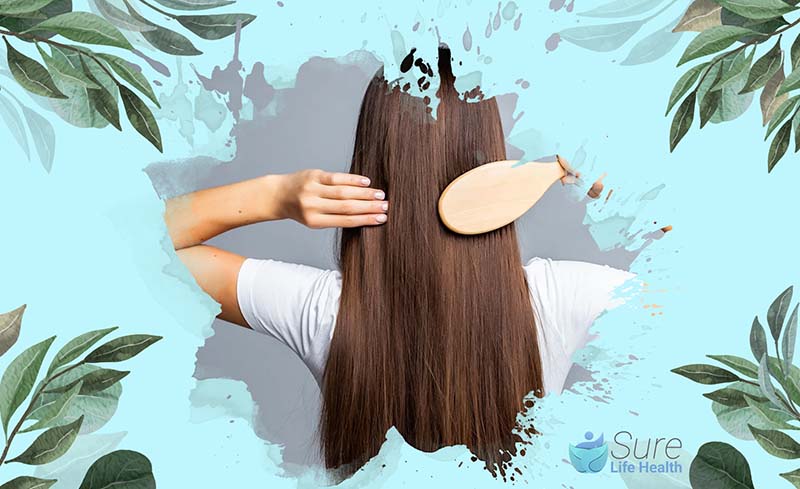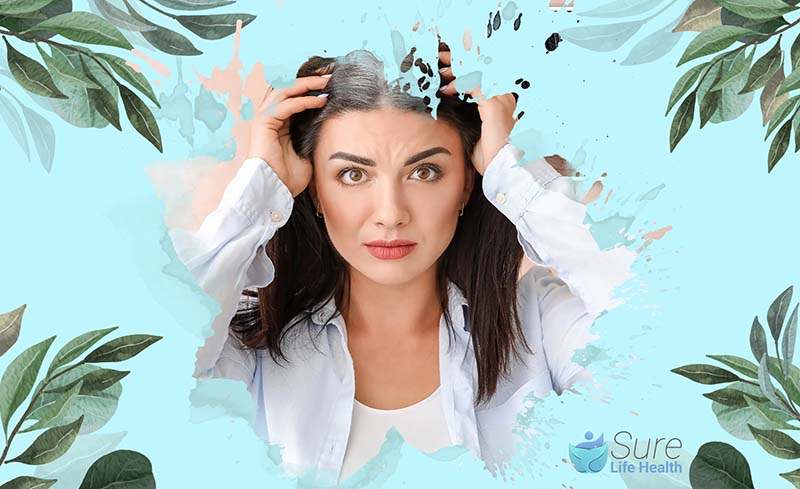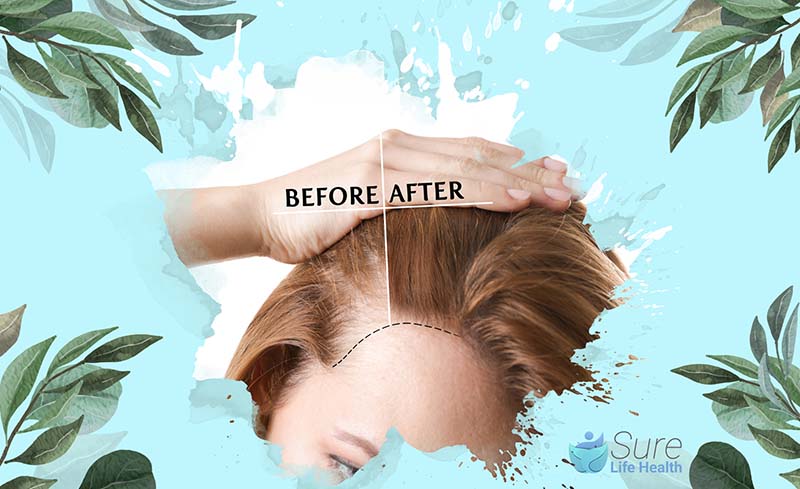Are you noticing more hair strands on your brush than the usual amount? Wondering if your new collagen supplement could be to blame? If you’re confused by the connection between collagen and hair health, you’ve come to the right place.
Our comprehensive guide explores the critical question, “Can collagen cause hair loss?” and provides information on how this popular supplement affects your hair. Join us as we unpack the myths and provide you with the facts you need to maintain lush, healthy locks.
How Collagen Helps Improve Your Hair?
Helps Protect Hair Follicles from Damage
Collagen serves as a powerful antioxidant, battling the damage caused by free radicals. Free radicals are harmful compounds that form in your body.
Stress, pollution, smoking, poor eating habits, alcohol, and other environmental factors are reasons for these free radicals.
They can damage your cells, proteins, and DNA, which includes your hair follicles. Collagen helps protect your hair by fighting these free radicals, promoting healthier hair growth.

Easy to Add to Your Daily Routine
Incorporating collagen into your diet is simple. It’s found in the connective tissues of animals like the skin, bones, and muscles of chicken, beef, pork, and fish. Also, eating vitamin C-rich foods such as oranges and bell peppers can enhance your body’s natural collagen production.
Alternatively, collagen is available in supplements like pills or powders, often in a hydrolyzed form, which makes it easier for your body to absorb.
Provides Amino Acids for Hair Growth
Hair primarily consists of keratin, a protein that your body makes using several amino acids, including proline.
Collagen is a great source of proline, so consuming collagen-rich foods or supplements provides the necessary components for building hair.

May Slow Down The Graying Of Hair
As we age, the cells responsible for producing melanin, the pigment that colors our hair, naturally start to decline. External stressors like poor diet and pollution can accelerate this process. Collagen’s antioxidant abilities may help reduce cell damage.
By fighting off these free radicals, collagen might help prevent premature graying and slow down the graying that comes with age.

May Prevent Hair Thinning Due To Aging
Collagen constitutes about 70% of your dermis, the middle layer of your skin where each hair root is housed.
As you age, your body’s collagen production decreases, and the renewal of dermis cells slows down. Regular collagen intake can help keep your dermis healthy and may prevent hair thinning as you get older.

Can Excessive Collagen Cause Hair Loss?
Can too much collagen cause hair loss? First, let’s unpack some science around this supplement.
How Does Collagen Impact Hair?
When you consume collagen, your digestive system breaks it down into amino acids. These are then absorbed into your bloodstream and help form new collagen in various parts of the body, including the skin, hair, and joints.
Many people find that regular collagen intake leads to shinier and stronger hair.
However, there’s a lack of comprehensive human studies specifically linking collagen to hair growth. Therefore, it’s hard to say exactly how collagen affects hair at a deeper level.

How Long Does It Take For Collagen To Improve Hair?
The time it takes for collagen to affect hair health varies among individuals due to differences in hair growth cycles.
Some users of collagen supplements report noticing improved hair texture within just two weeks.
Nevertheless, actual growth may take a month or more. Since hair grows slowly, consistent intake of collagen is necessary over a period to see the best results.
Can Collagen Cause Hair Loss?
Collagen supplements are unlikely to cause hair loss. However, excessive collagen can be associated with scleroderma, an autoimmune disease that leads to the overproduction of collagen.
This condition primarily affects the skin but can have other systemic complications.
Typically, the human body needs about 10,000 mg (or 10 grams) of collagen per day. It’s usually safe to take a collagen supplement of up to 10 grams daily to help combat signs of aging, but individual needs can vary.
Always consult with a healthcare professional before significantly altering your supplement intake.
Which Type Of Collagen Is Best For Hair Growth?
Types I and III collagen are generally considered the best for supporting hair health, as they are predominant in the skin and hair. Type V collagen also plays a role in the formation of hair.
When choosing a collagen supplement, it’s crucial to opt for high-quality products from reputable sources. Hydrolyzed collagen is recommended because it’s broken down into smaller peptides, easier to absorb. Steer clear of supplements that contain fillers or unnecessary additives to ensure purity and effectiveness.

Conclusion
In summary, the relationship between collagen and hair health is complex but largely positive. We’ve addressed the often-asked question, “Can collagen cause hair loss?” and provided evidence that suggests collagen is more likely to benefit your hair than harm it.
As you consider integrating collagen supplements into your health regimen, remember that individual results can vary. We’d love to hear about your experiences with collagen and hair health. Please share your stories in the comments below and explore more insightful articles from Sure Life Health for further information on enhancing your wellness journey.
Professor Gaye Cunnane, PhD, MB, FRCPI
As the Director of Health and Wellbeing at RCPI, Professor Gaye Cunnane is at the helm of initiatives aimed at enhancing the health and well-being of RCPI Trainers and Trainees. Her role extends beyond administration; she is also a respected clinical professor of rheumatology and a consultant rheumatologist at Trinity College Dublin (TCD) and St James’s Hospital. Prof. Cunnane’s medical journey began at TCD, where she graduated from medical school, and her path has been marked by both clinical and academic excellence.
After completing her basic clinical training in medicine, she embarked on PhD studies at University College Dublin and St Vincent’s University Hospital. Her research during this period was focused on prognostic markers in early inflammatory arthritis, a project that saw her collaborating with esteemed universities across Europe, including in Switzerland, The Netherlands, the UK, and Sweden.
Prof. Cunnane’s career took her to the University of California, San Francisco, where she spent three years delving into research on new treatments for lupus. Her academic prowess led her to the University of Leeds in 2001 as a senior lecturer, before returning to Ireland in 2003 to assume her current roles. She has also served as the National Specialty Director for Rheumatology training in Ireland, Programme Director for Basic Specialist Training with RCPI, and as a past President of the Irish Society for Rheumatology.
PUBLISHED ARTICLES
“Rheumatic disease differentiation using immunoglobulin G sugar printing by high-density electrophoresis”: Published in The Journal of Rheumatology, this study reflects her in-depth investigation into rheumatic diseases.
“Benefits of exercise in patients with rheumatoid arthritis: a randomized controlled trial”: This research work, highlighting the positive impact of exercise on rheumatoid arthritis, underscores Prof. Cunnane’s dedication to practical, patient-centered research.
Additionally, Prof. Cunnane has made notable contributions to the Annals of the Rheumatic Diseases, discussing early referral, diagnosis, and treatment of rheumatoid arthritis. She has also been involved in a study on the NCBI platform investigating exercise benefits in rheumatoid arthritis patients.
Professor Gaye Cunnane’s career is a testament to her commitment to improving patient outcomes in rheumatology through rigorous research, clinical excellence, and dedicated teaching. Her work continues to influence the field of rheumatology, both in Ireland and internationally.

